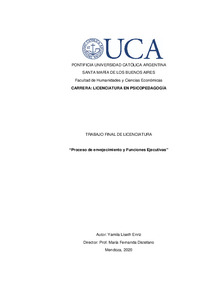Por favor, use este identificador para citar o enlazar este ítem:
https://repositorio.uca.edu.ar/handle/123456789/12445| Campo DC | Valor | Lengua/Idioma |
|---|---|---|
| dc.contributor.advisor | Distefano, María Fernanda | es |
| dc.contributor.author | Enriz, Yamila Liseth | es |
| dc.date.accessioned | 2021-10-12T12:26:17Z | - |
| dc.date.available | 2021-10-12T12:26:17Z | - |
| dc.date.issued | 2021 | - |
| dc.identifier.citation | Enriz, Y. L. Proceso de envejecimiento y funciones ejecutivas [en línea]. Tesis de Licenciatura. Pontificia Universidad Católica Argentina. Facultad de Humanidades y Ciencias Económicas, 2021. Disponible en: https://repositorio.uca.edu.ar/handle/123456789/12445 | es |
| dc.identifier.uri | https://repositorio.uca.edu.ar/handle/123456789/12445 | - |
| dc.description.abstract | Resumen: Esta investigación tiene por objeto identificar si existe una diferencia significativa en el funcionamiento ejecutivo, respecto a la base neuropsicológica de la región orbitomedial, en un grupo de adultos mayores no institucionalizados que asiste a un Club de día habitualmente, y un grupo de adultos mayores institucionalizados que residen en geriátricos. Para ello se administraron los subtests que evalúan funciones neurocognitivas del área orbitomedial de la Batería Neuropsicológica de Funciones Ejecutivas y Lóbulos Frontales- 2 (BANFE- 2) que evalúa el desempeño de las funciones ejecutivas en personas de habla hispana, desde los 6 años hasta la edad adulta (Flores Lázaro, Ostrosky Shejet y Lozano Gutiérrez, 2014), y una encuesta aplicada a los encargados de las instituciones, con el objetivo de conocer algunos factores relacionados al funcionamiento del área orbitomedial, y caracterizar a la población según su procedencia. Las preguntas planteadas en dicha encuesta abordaron temas y contenidos relacionados con intereses y motivaciones de los adultos mayores, control conductual y personalidad, tolerancia a la frustración-agresividad y estado de ánimo, entre otros. A partir del análisis de los resultados obtenidos se puede observar ciertas tendencias estables en el funcionamiento ejecutivo de ambos grupos. La mayoría de las personas pertenecientes al Club de Día poseen un funcionamiento adecuado de las capacidades de procesamiento y regulación de las emociones y estados afectivos, así como de la regulación y el control de la conducta; mientras que las personas pertenecientes al Geriátrico presentan un rendimiento menor en estas capacidades. | es |
| dc.description.abstract | Abstract: This research aims to identify whether there is a significant difference in executive functioning with respect to the neuropsychological basis of the orbitomedial region in a group of non-institutionalized older adults who regularly attend a day club, and a group of institutionalized older adults who reside in nursing homes. In order to achieve this objective, the subtests that evaluate neurocognitive functions of the orbitomedial area of the Neuropsychological Battery of Executive Functions and Frontal Lobes-2 (BANFE-2) were administered, which evaluates the performance of executive functions in Spanish-speaking people, from 6 years to adulthood (Flores Lázaro, Ostrosky Shejet and Lozano Gutiérrez, 2014), and a survey applied to those in charge of the institutions, with the aim of knowing some factors related to the functioning of the orbitomedial area, and characterizing the population according to its origin. The questions proposed in the previously mentioned survey addressed topics and content related to the interests and motivations of older adults, behavioral control and personality, tolerance to frustration-aggressiveness and mood, among others. To conclude, the analysis of the results obtained shows us certain trends in the executive functioning of both groups can be observed. Most of the people belonging to the Day Club possess an adequate functioning of the capacities for processing and regulating emotions and affective states, as well as the regulation and control of behavior; while people belonging to the Geriatric have a lower performance in these capacities. | es |
| dc.format | application/pdf | es |
| dc.language.iso | spa | es |
| dc.rights | Acceso abierto | * |
| dc.rights.uri | http://creativecommons.org/licenses/by-nc-sa/4.0/ | * |
| dc.source | Tesis de Licenciatura, 2021. Departamento de Humanidades. Facultad de Humanidades y Ciencias Económicas. Pontificia Universidad Católica Argentina | es |
| dc.subject | FUNCIONES EJECUTIVAS | es |
| dc.subject | ADULTOS MAYORES | es |
| dc.subject | GERIATRIA | es |
| dc.subject | DESARROLLO COGNITIVO | es |
| dc.subject | ENVEJECIMIENTO | es |
| dc.subject | DETERIORO COGNITIVO LEVE | es |
| dc.title | Proceso de envejecimiento y funciones ejecutivas | es |
| dc.type | Trabajo final de grado | es |
| uca.disciplina | PSICOPEDAGOGIA | es |
| uca.issnrd | 1 | es |
| uca.affiliation | Fil: Enriz, Yamila Liseth. Pontificia Universidad Católica Argentina. Facultad de Humanidades y Ciencias Económicas; Argentina | es |
| uca.version | publishedVersion | es |
| item.fulltext | With Fulltext | - |
| item.languageiso639-1 | es | - |
| item.grantfulltext | open | - |
| Aparece en las colecciones: | Licenciatura en Psicopedagogía | |
Ficheros en este ítem:
| Fichero | Descripción | Tamaño | Formato | |
|---|---|---|---|---|
| proceso-envejecimiento-funciones.pdf | 2,16 MB | Adobe PDF |  Visualizar/Abrir |
Visualizaciones de página(s)
590
comprobado en 27-abr-2024
Descarga(s)
2.334
comprobado en 27-abr-2024
Google ScholarTM
Ver en Google Scholar
Este ítem está sujeto a una Licencia Creative Commons

